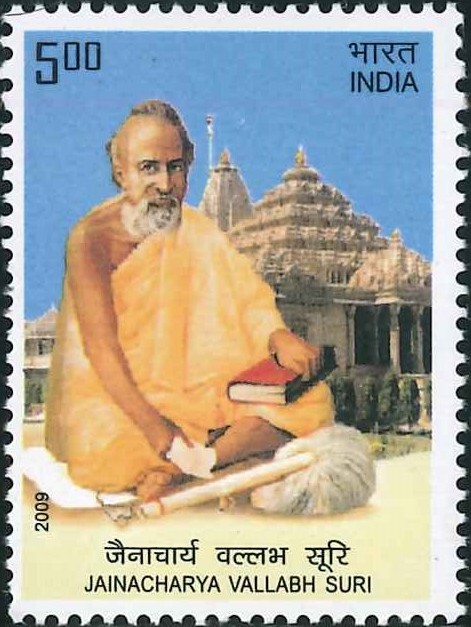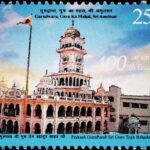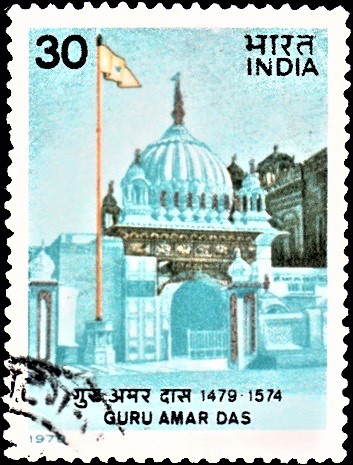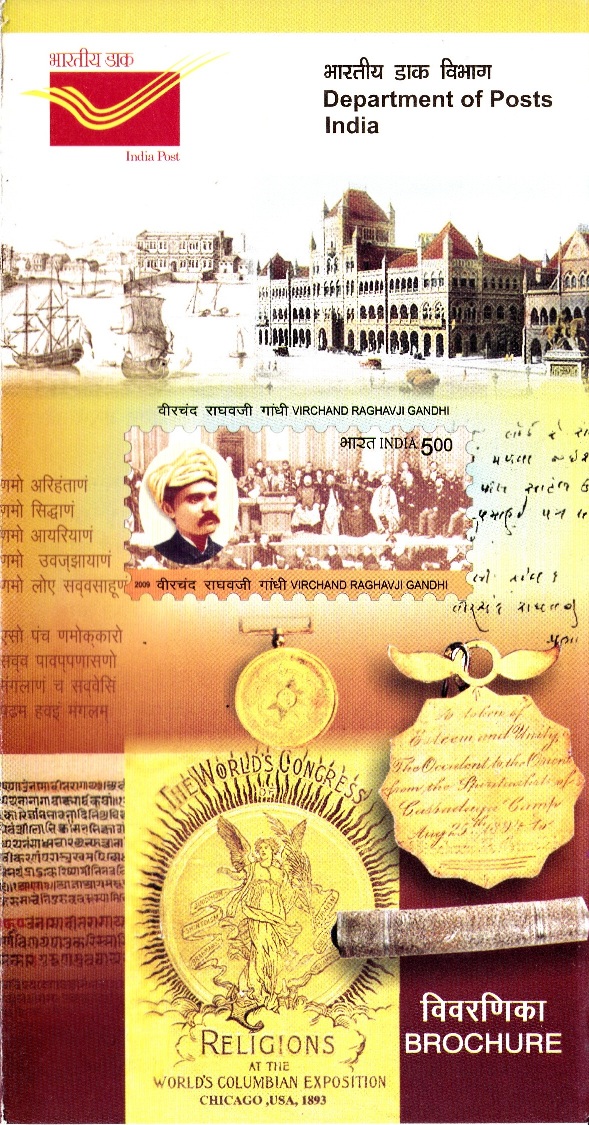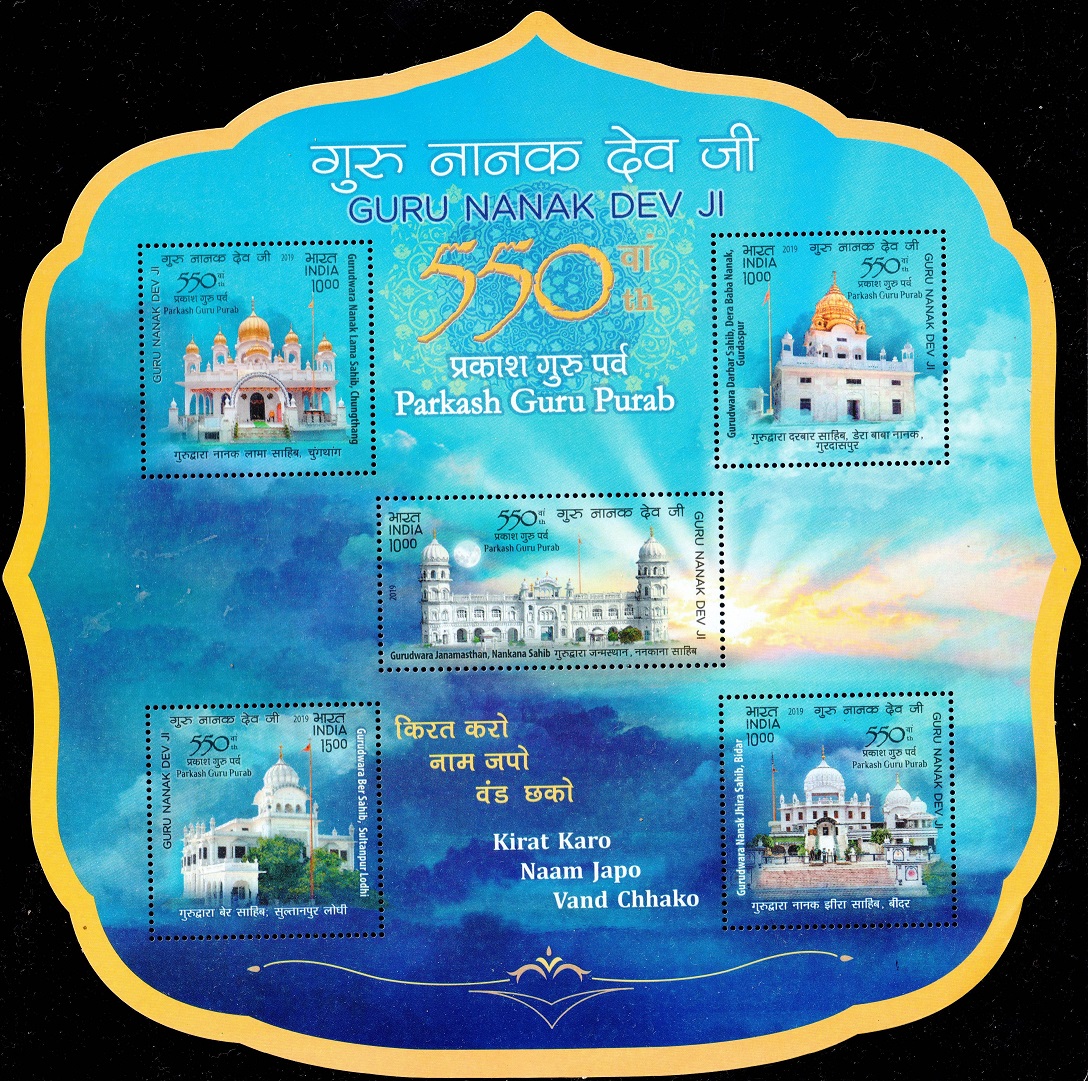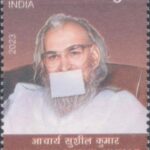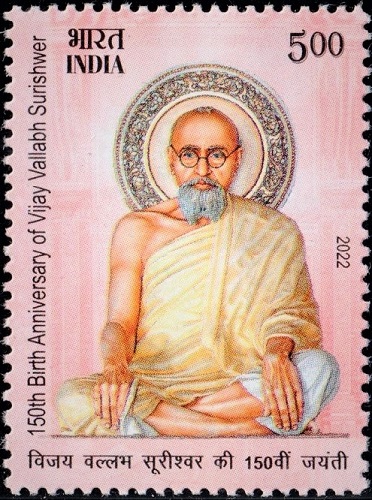
Vijay Vallabh Surishwer
A commemorative postage stamp on 150th Birth Anniversary of Acharya Vijay Vallabhsuri, a Jain monk :
 Issued by India
Issued by India
Issued on Oct 18, 2022
Issued for : India Post is pleased to issue Commemorative Postage Stamp on Vijay Vallabh Surishwer and appreciates his contribution to serve millions through spirituality, education and nation building.
Credits :
Stamp/FDC/Brochure : Anuj Zood
Cancellation Cachet : Mrs Nenu Gupta
Type : Stamp, Mint Condition
Colour : Multi Colour
Denomination : 500 Paise
Stamps Printed : 451600
Printing Process : Wet Offset
Printer : Security Printing Press, Hyderabad
Name : Chhagan
Born on Oct 26, 1870 at Baroda [now Vadodara], Gujarat, India
Died on Sep 22, 1954 at Byculla, Bombay [now Mumbai], India
About :
- Jainism is one of the ancient religions of India, and is an integral part of Indian culture. Jainism teaches that the path to enlightenment is through nonviolence and reducing harm to living things (including plants and animals) as much as possible.
- Life of Vijay Vallabh Surishwer is an example of humanism and spiritualism. He was born at Vadodara on 26 October, 1870 to Deepachand Icchabai. In search of peace and salvation of soul, he studied under his holiness Jain Acharya Shree Vijayanand Suriji, popularly known as Guru Atmaramji, a highly venerated Saint and a profound scholar of Jainism. Chhagan (his childhood name) entered monkhood, renouncing worldly life in 1887 at Radhanpur (Gujarat). He was christened as Muni Vallabh Vijay.
- Guru Atmaramji taught Vijay Vallabh, the Jain philosophy propounded by Lord Mahavir viz Ahimsa (non-violence), Anekant (non-absolutism), Aparigraha (non-possessiveness). Vijay Vallabh also mastered study of contemporary religions. His Guru ordained Vijay Vallabh to set up, not only places of worship, but also educational institutions and service centres which would help both men and women to understand religion in its true perspective.
- True to his Guru, Vijay Vallabh worked for the welfare of the society irrespective of caste, class and creed. He initiated various programmes to eradicate ignorance, superstition and illiteracy. His humane approach, scientific outlook and practical life endeared him to the masses. He was bestowed with Acharyaship in 1924 at Lahore (now in Pakistan).
- He placed before the mankind, both by precept and practice, the highest moral and spiritual values of life. He widely traveled barefooted as enjoined on Jain Monks, many times all-over Maharashtra, Gujarat, Saurashtra, Rajasthan, U.P., M.P., Punjab and Jammu & Kashmir to spread this message.
- This visionary Saint, realizing the prime needs of the society emphasized on giving moral and righteous education to improve standard of life. He laid special emphasis on the education of women. He motivated the society to establish a large number of schools, colleges, gurukuls, libraries and centres of craft and learning in many parts of the country. Opening of Shri Mahavira Jain Vidyalay at Mumbai as far back as 1915 and its subsequent branches, Shri Atmanand Jain Gurukul at Gujranwala and Shri Atmanand Jain College at Ambala are just but a few of the glorious examples.
- Vijay Vallabh was an exponent of research work. He became instrumental in collecting and preserving thousands of volumes of priceless handwritten manuscripts and published works on Indology at Shri Mahavira Jain Vidyalaya, Mumbai and Jain Gurukul Gujranwala and other libraries as valuable storehouse of knowledge and cultural heritage. He advised to marshal the existing knowledge within the framework of modern research.
- Vijay Vallabh aroused people from slumber wherever he went during the freedom movement. Identifying himself with the freedom struggle, he wore khadi throughout his life. He was a patriot to the core. Swadeshi found an echo in his speeches.
- Vijay Vallabh strongly deprecated display of wealth and extravagance on social occasions, dowry and such other evils. Though born in Gujarat, he always promoted Hindi as national language. He was a renowned orator, author and poet. In addition to several works in prose, he wrote about 4000 poems, songs and hymns in Hindi, rich both in language and content.
- Vijay Vallabh came into contact with great patriots of the nation like Mahatma Gandhi, Pandit Motilal Nehru, Shri Morarji Desai, Lala Lajpat Rai, Pandit Madan Mohan Malviya and other stalwarts of the freedom movement and luminaries of pre and post independence era. He supported Satyagraha and non-cooperation as potent yet non-violent tools to achieve independence. His formula for World peace was highly appreciated by Shri Morarji Desai and the then Prime Minister Shri Jawahar Lal Nehru.
- For the all round development of the society, he had, in fact, made Shiksha (education), Seva (service), Sangathan (unity), Sahitya (literature) and Swavlamban (self-reliance) as his creed and mission of life.
- Vijay Vallabh breathed his last at Mumbai in September 1954 where a Samadhi Mandir has been built in Byculla. A multifaceted grand memorial was later constructed at Delhi comprising of a Jain Temple, Guru Mandir, Research Institute, School, Museum of Jain Art, Birds Hospital and matching infrastructure, which apart from being a sacred devotional centre also works for taking Guru Vallabh’s Mission further.
- Text : Vallabh Smarak, Delhi.
Subscribe
Login
0 Comments
Oldest


